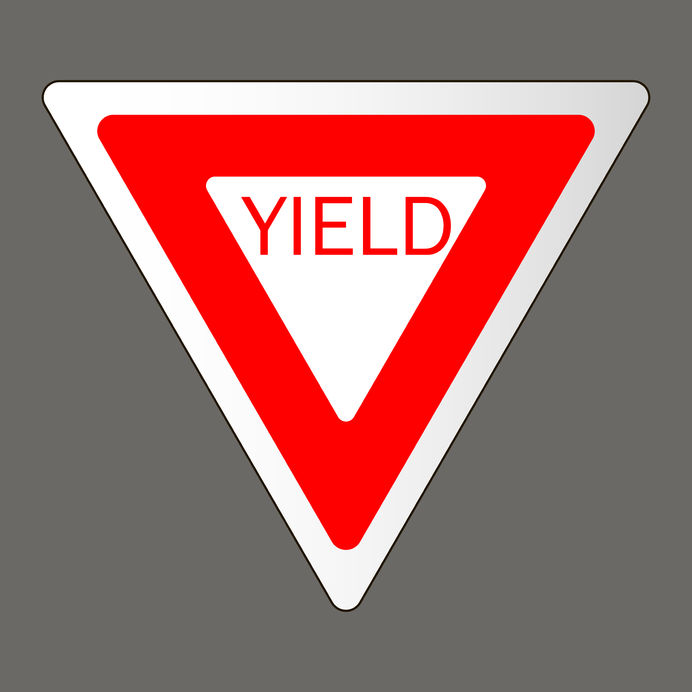Failing to Yield Can Cause Accidents
July 11, 2018 | Category: Automobile Accidents | ShareDriving is a privilege, not a right. An obligation that comes with the privilege of driving is the duty of care that each driver owes to the other drivers on the road.
One of the easiest ways to get into a collision with another vehicle is a failure to yield the right of way. Drivers who fail to yield to other drivers with whom they are sharing the road can cause accidents.
 Although traffic laws vary slightly from jurisdiction to jurisdiction, as a driver, you must generally yield the right of way in the following circumstances:
Although traffic laws vary slightly from jurisdiction to jurisdiction, as a driver, you must generally yield the right of way in the following circumstances:
- At a yield sign;
- To pedestrians in a crosswalk;
- To persons using a seeing eye guide dog;
- To persons using a white cane with or without a red tip;
- At uncontrolled intersections where vehicles are already in the intersection;
- At “T” intersections where you must yield to vehicles on the through road;
- When turning left in which case you must yield to oncoming pedestrians, cars, etc.;
- When driving on an unpaved road that intersects with a paved road; and
- When returning to the roadway after the car is parked.
The law gives the right of way to no one, but it does state who must yield the right of way. Every driver must do everything possible to avoid a crash.
Failure to yield under Florida law
Florida law provides several examples of situations in which a driver is required to yield. These situations are as follows:
Florida Statute 316.079 - Duty to Yield to Highway Construction Workers
Every driver of a vehicle shall yield the right-of-way to a pedestrian worker and flag person who is doing maintenance or construction work on a highway when the driver is notified of the presence of the workers by a flag person, or a warning sign, or a device.
Florida Statute 316.0815 - Duty to Yield to Public Transit Vehicles
The driver of a vehicle shall yield the right-of-way to a publicly-owned transit bus traveling in the same direction, which has signaled and is reentering the traffic flow.
Florida Statute 316.121 - Vehicles Approaching or Entering Intersections
The driver of a vehicle approaching an intersection shall yield the right-of-way to a vehicle, which has entered the intersection from a different highway.
When two vehicles enter an intersection from different highways at the same time, the driver of the vehicle on the left shall yield the right-of-way to the vehicle on the right. The driver of a vehicle that is about to enter a public roadway that is not dictated by a traffic control device shall yield the right of way to all oncoming traffic.
Florida Statute 316.122 - Vehicle Turning Left
A driver intending to turn LEFT on an intersection, into an alley, on a private road, or in a driveway shall yield the right-of-way to any vehicle approaching from the opposite direction, or any vehicle passing on the left of the turning vehicle.
Florida Statute 316.123 - Vehicle Entering Stop or Yield Intersection
The driver of a vehicle approaching a yield sign shall, in obedience to such sign, slow down to a speed reasonable for the existing conditions and, if required, shall stop before entering the crosswalk or intersection. After slowing or stopping, the driver shall yield the right-of-way to any vehicle in the intersection or approaching on another highway.
Generally, failure-to-yield accidents are caused by negligence. Negligence is the failure to act with the care that a reasonably prudent person would exercise under the same circumstances. A victim who bases his or her personal injury claim on negligence must show that the defendant:
- Owed the victim a duty to exercise reasonable care;
- Violated the duty of care; and
- Harmed the victim by breaching the duty of care.
When someone is injured in a car crash that was caused by a negligent driver, they may be able to take legal action against that driver and receive damages for their injuries and property damage from the accident.
What do you do if you are involved in a failure-to-yield accident?
“When injured in a vehicle accident, you should first call an ambulance to transport you to the hospital to have your injuries evaluated. After seeking medical help, you or someone at the scene should, if safely possible, take photographs of damage to your vehicle, damage to the other vehicle, and the scene of the accident. You should exchange contact and insurance information with the other driver. You should gather contact information of any witnesses to the accident and provide that information to your insurer and attorney. When injured in a vehicle accident, after seeking medical attention, please contact our team of experienced attorneys. We are available to assist you,” said Fort Myers Car Accident Attorney, Randall Spivey of Spivey Law Firm, Personal Injury Attorneys, P.A.
Fort Myers Car Accident Attorney, Randall L. Spivey is a Board Certified Trial Attorney – the highest recognition for competence bestowed by the Florida Bar and a distinction earned by just one (1%) percent of Florida attorneys. He has handled over 2,000 personal injury and wrongful death cases throughout Florida. For a free and confidential consultation to discuss your legal rights, contact the Spivey Law Firm, Personal Injury Attorneys, P.A., in Lee County at 239.337.7483 or toll free at 1.888.477.4839, or by email to Randall@SpiveyLaw.com. Visit SpiveyLaw.com for more information. You can contact Spivey Law Firm, Personal Injury Attorneys, P.A.in Charlotte County at 941.764.7748 and in Collier County 239.793.7748.

